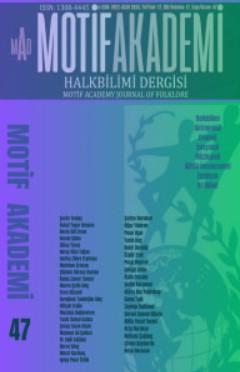KLASİK TÜRK EDEBİYATINDA HURMA
DATE FRUIT IN CLASSICAL TURKISH LITERATURE
Author(s): Işılay Pınar ÖzlükSubject(s): Customs / Folklore, Turkish Literature, Health and medicine and law, Theory of Literature
Published by: Motif Halk Oyunları Eğitim ve Öğretim Vakfı
Keywords: Classical Turkish Literature; Divan; Date Fruit; Symbol; Food;
Summary/Abstract: When the subjects covered in the works of classical Turkish literature are considered, it is seen that social life is one of the areas that provide the greatest material for researchers. Many topics ranging from clothing and dress to customs and beliefs can be followed through literary texts. One of these topics is food and beverage culture. The activity of feeding, which is the primary need of every living thing, has gained a symbolic meaning with the change and development of societies as well as keeping people alive. The fact that food and beverages find a place in customs and are used in proverbs with similes and metaphors is frequently encountered in literary texts. Research on a food or drink may lead us to a religious or mythological story or a historical fact. The number of food elements with such a back ground in our literary texts is not small at all. From figs to olives, from lohusa sherbet to halva, from ashura to pomegranate, many fruits, vegetables, foods and beverages have a story of their own. One of the fruits with a story is "date fruit”. Date fruit; It is a food worth examining in terms of being mentioned in the Qur'an, taking place in the stories of the saints, being the subject of mythological events, being used in meals and desserts in gastronomy, as well as studies in the field of health.
Journal: Motif Akademi Halkbilimi Dergisi
- Issue Year: 17/2024
- Issue No: 47
- Page Range: 1527-1542
- Page Count: 16
- Language: Turkish

